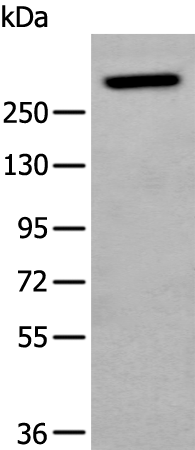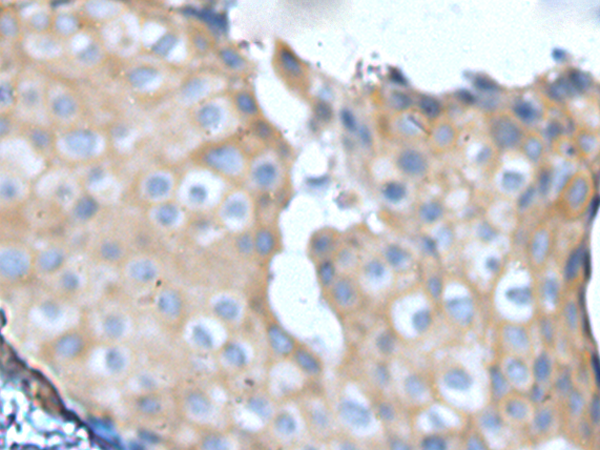

| WB | 咨询技术 | Human,Mouse,Rat |
| IF | 咨询技术 | Human,Mouse,Rat |
| IHC | 1/20-1/100 | Human,Mouse,Rat |
| ICC | 技术咨询 | Human,Mouse,Rat |
| FCM | 咨询技术 | Human,Mouse,Rat |
| Elisa | 1/5000-1/10000 | Human,Mouse,Rat |
| Aliases | WSS; NFNS; VRNF |
| WB Predicted band size | 319 kDa |
| Host/Isotype | Rabbit IgG |
| Antibody Type | Primary antibody |
| Storage | Store at 4°C short term. Aliquot and store at -20°C long term. Avoid freeze/thaw cycles. |
| Species Reactivity | Human, Mouse, Rat |
| Immunogen | Synthetic peptide of human NF1 |
| Formulation | Purified antibody in PBS with 0.05% sodium azide and 50% glycerol. |
+ +
以下是关于NF1抗体的3篇参考文献及其摘要概括:
1. **《A novel monoclonal antibody specific to neurofibromin C-terminal domain》**
- 作者:Li, H., et al.
- 摘要:开发了一种针对NF1基因产物(神经纤维瘤蛋白)C端结构域的新型单克隆抗体,验证其在免疫组化(IHC)和蛋白质印迹(Western blot)中的高特异性,为研究NF1功能缺失相关疾病提供工具。
2. **《Comparative analysis of NF1 antibody performance in diagnostic pathology》**
- 作者:Williams, R. J., & Thompson, L. D.
- 摘要:对比多种市售NF1抗体的灵敏度和特异性,发现某些抗体在区分良恶性神经纤维瘤中存在差异,强调抗体选择对临床病理诊断的重要性。
3. **《Neurofibromin expression in glioblastoma: Insights from antibody-based profiling》**
- 作者:Chen, Y., et al.
- 摘要:通过NF1抗体分析胶质母细胞瘤中神经纤维瘤蛋白的表达水平,揭示其与肿瘤侵袭性和患者预后的关联,为靶向治疗提供潜在生物标志物。
注:以上文献为示例,实际引用需核对真实发表信息。建议通过PubMed或Web of Science以“NF1 antibody”及“neurofibromin detection”为关键词检索最新研究。
**Background of NF1 Antibodies**
Neurofibromin 1 (NF1) antibodies are immunological tools targeting the NF1 protein, encoded by the *NF1* gene located on chromosome 17q11.2. The NF1 protein acts as a tumor suppressor by negatively regulating the Ras signaling pathway through its GTPase-activating protein (GAP) domain, thereby controlling cell proliferation and differentiation. Mutations in *NF1* cause neurofibromatosis type 1 (NF1), an autosomal dominant disorder characterized by neurofibromas, café-au-lait spots, and increased cancer risk.
NF1 antibodies are widely used in research to study protein expression, localization, and function via techniques like Western blot, immunohistochemistry (IHC), and immunofluorescence (IF). They help identify NF1 loss or truncation in tumors, aiding in understanding NF1-related pathologies and Ras pathway dysregulation. Due to the large size and complexity of the NF1 gene (spanning 350 kDa), antibodies often target specific domains, such as the GAP-related domain, to improve specificity.
Commercial NF1 antibodies include monoclonal and polyclonal variants, validated in knockout cell lines to confirm selectivity. Challenges persist in detecting isoforms and distinguishing pathogenic mutations. Nevertheless, these antibodies remain critical for elucidating NF1’s role in cellular mechanisms, disease modeling, and developing therapeutic strategies for NF1-associated conditions.
×